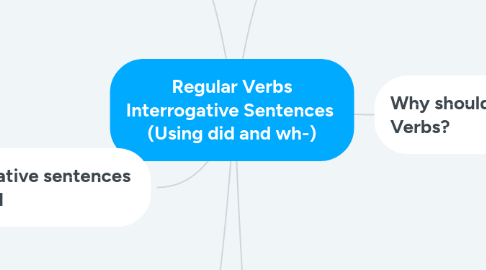Regular Verbs Interrogative Sentences (Using did and wh-)
Edgar Wuにより


1. Interrogative sentences
1.1. Interrogative sentences are one of the four sentence types (declarative, interrogative, imperative, exclamative).
1.2. Interrogative sentences ask questions.
1.3. We use interrogative sentences frequently in spoken and written language. They are one of the most common sentence types.
1.3.1. Examples: Is it cold outside? Are you feeling better? Did you like it? What is your name?
2. Interrogative sentences using did
2.1. If the verb is 'normal', the interrogative is formed with the auxiliary do/does/did.
2.2. As always after an auxiliary verb, the verb is added in the infinitive without to.
2.2.1. Examples: Do you like that album? Did she see the movie? Does Kevin drink alcohol?
3. Interrogative sentences using wh-
3.1. Wh- question are questions starting with wh- words including: what, when, where, who, whom, which, whose, why, and how.
3.2. Question word are used to ask about specific qualities, times, places, people, and so on.
3.2.1. Example: What are you doing? When will the meeting start? Where do you live? Who told you that story? Which one do you choose? Why is he crying? How can you get here?
4. What is a regular verbs?
4.1. A regular verb is one that conforms to the usual rule for forming its simple past tense and its past participle.
4.1.1. Examples: play > played work > worked keep > kept bleed > bled set > set
5. Why should I care about Regular Verbs?
5.1. Somewhat counter intuitively, the most common verbs in English are the irregular verbs. They are a pain, but if you are learning or teaching English, you must embrace them. that said, there are some extremely useful regular verbs.
6. Regular verbs are weak verbs
6.1. A regular verb is a type of weak verb.
6.1.1. The terms "Regular verbs" and "weak verbs" are not synonyms. Similarly, the terms "irregular verbs" and "strong verb" are not synonyms.
6.1.2. Weak verbs Past form: Ends "ed","d", or "t" (with or without a base change).
6.1.3. Strong verbs Past form: Ends "n","en", or "ne" AND/OR base change.
